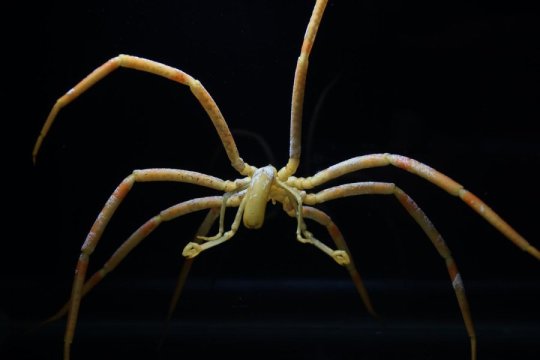To keep blood and oxygen flowing throughout their bodies, most animals depend on a beating heart. But researchers reporting have discovered that sea spiders use a strange alternative: they move blood and oxygen throughout most of their bodies by pumping their guts.
The sea spiders have an unusual gut in the first place, the researchers say, according to Science Daily.
“Unlike us, with our centrally located guts that are all confined to a single body cavity, the guts of sea spiders branch multiple times and sections of gut tube go down to the end of every leg,” says H. Arthur Woods. “In effect, sea spiders guts are ‘space-filling’ and ubiquitous in their bodies in the same way that our circulatory systems are space-filling and ubiquitous.”
So, how do they use that branching system to move fluids? The answer is gut peristalsis. In fact, the human gut also uses peristalsis — waves of involuntary constriction and relaxation of muscles — to mix gut contents and move them along. Sea spiders, which take in oxygen directly through their cuticles, show peristaltic waves that are much more vigorous than would be needed for digestion.
Woods and colleagues made that discovery after a mission to explore a phenomenon known as “polar gigantism.” Scientists had long observed that polar species, including giant sea spiders, have larger bodies than their more temperate or tropical relatives. That trend raises a lot of intriguing questions about how the polar species manage basic life processes, including how to get enough oxygen into their bodies.
One of the things that make sea spiders a great organism for study is “that they are really skinny and, using a microscope, you can see easily into their bodies,” Woods says. In his first season, Woods found himself spending “a lot of time just watching blood and gut flows in sea spiders.”
He soon realized that the sea spiders’ hearts were beating only weakly. Their hearts weren’t moving any blood beyond the spiders’ central portion. In contrast, he noticed, their guts showed very strong and organized waves of peristaltic contractions.
“My ‘aha!’ moment was to consider that maybe all that sloshing of blood and guts was not about digestion but instead about moving respiratory gases around,” he says.
A series of experiments and observations in 12 sea spider species involving video microscopy of tracers in the animals’ hemolymph and guts together with experimental manipulation of the guts’ ability to contract allowed them to test out and confirm that hypothesis.
The researchers say that the findings highlight the vast evolutionary diversity of solutions to problems that all animals encounter. It’s not clear whether the sea spiders’ space-filling guts first arose for purely digestive functions and the respiratory benefits came later or vice versa.
Woods says that future fossil finds might help to weigh in on the evolutionary origins of the animals’ unusual respiratory strategy. It would also be worthwhile to explore gas transport in other living arthropods with similarly complex guts.
N.H.Kh

